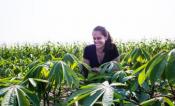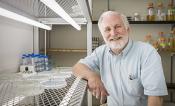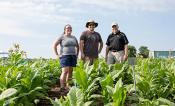
RIPE researchers among 2019’s most influential scientists
This year RIPE has four team members recognized as Highly Cited Researchers by the Web of Science group.

Breaking ground on phenotyping facility at the University of Illinois Research Park
Representatives from Illinois and the Gates Foundation broke ground on a state-of-the-art phenotyping facility.

Scientists find ways to improve cassava, a ‘crop of inequality’ featured at Goalkeepers
A new study has identified opportunities to increase the yields of the staple root crop cassava.

Missing link in algal photosynthesis found, offers opportunity to improve crop yields
Our team discovered a missing link in the photosynthetic process of green algae that could help boost crop productivity.

Improved model could help scientists better predict crop yield, climate change effects
Our team created a computer model of how microscopic leaf pores open in response to light to create better virtual plants.

Scientists stack algorithms to improve predictions of yield-boosting crop traits
RIPE researchers have stacked together six algorithms to more accurately predict high-yielding crop traits.

New technology allows scientists to measure photosynthesis much more quickly
A new method can quickly capture improvements to plants' natural capacity to harvest energy from the sun.

Long elected to the National Academy of Sciences
University of Illinois crop sciences and plant biology professor Stephen P. Long is one of 100 new members elected to the National Academy of Sciences.

Scientists engineer shortcut for photosynthetic glitch, boost crop growth by 40 percent
The RIPE project has engineered a shortcut for photorespiration—an energy-expensive process—and increased crop productivity by 40 percent.
